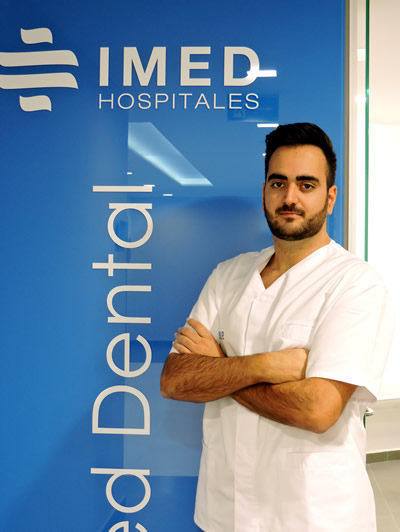Orofacial pain, that affects around 6% of the adult population, is the result of a painful impulsecaused by face and mouth lesions. Its treatment, occasionally, is complicated because the nerves incharge of collecting the orofacial sensitivity have an intricate organization.
Even if normally is treated by the dentist, in some special cases the orofacial pain requires amultidisciplinary treatment (orthopedist, dentist, physiotherapist and physiologist) providingtechniques on each specialty that help to the patient’s functionality recovery and a better quality oflife facing pain.
Orofacial pain specialists
What is obvious is that because of its complexity it requires specialists as Dr. Carlos AguilarGonzález, expert dentist in orofacial pain treatment and integrated in the medical team of IMEDHospitals.
Dr. Carlos Aguilar explains more details about its treatment.
The orofacial pain is a specialty dedicated to prevention, diagnosis and treatment of painful disordersthat affects to the oral and face area. These disorders include:
- Craniomandibular dysfunction
- Pain of neuropathic cause
- Disorders of intraoral cause
- Intracranial or extracranial pathology
- Systematic pathology with orofacial pain
The Orofacial Pain specialist does the diagnosis of this kind of pathology through a complete clinicalhistory, that sometimes require extra tests, as blood test and/or imaging diagnosis, including apsychosocial evaluation of the patient.
Treatment can include drugs prescription, physiotherapy treatments, procedures to decrease pain, aswell as an important work of education for patients and family, about this pathology.
Craniomandibular dysfunction
Within the symptoms of orofacial pain, craniomandibular dysfunction (CMD), or also calledtemporomandibular disorders (TMD), include all disorders that deal with chewing muscles and/ortemporomandibular joints (TMJ). Craniomandibular dysfunction is the most frequent second cause oforofacial pain after dental pain.
In case you answer yes to one of the next questions maybe you suffer from craniomandibulardysfunction:
- It is difficult for you to open the mouth?
- Do you notice noise in your jaw joints?
- Is your jaw sometimes fit in, blocked or dislocated?
- Do you have pain in your cheeks or around your ears?
- Do you have pain when you chew, yawn or open widely the mouth?
- Do you feel that your way of chew is uncomfortable or it changed lately?
- Did you suffer any trauma in the jaw, head or neck?
- Did you ever have arthritis?
The causes of craniomandibular dysfunction are not known. Normally are from multifactorial cause.Known causal factors include traumatism or lesions at orofacial level and degenerative jointpathology as arthritis. Other factors that are related to the perpetuation of the craniomandibulardysfunction are parafunctional habits as bruxism or teeth squeal, and cervical muscular and chewingstress.
Symptoms fluctuate over time in craniomandibular dysfunction that is a chronicle pathology.Treatment success of craniomandibular dysfunction is based in therapies focused in self-caretechniques and the control of those factors that can worsen the symptoms.

